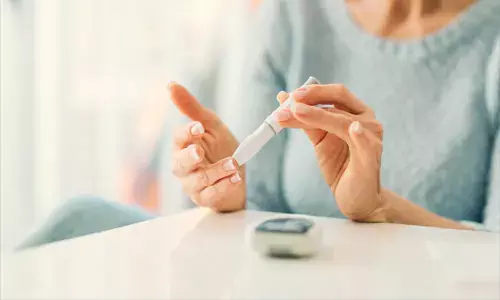- Home
- Medical news & Guidelines
- Anesthesiology
- Cardiology and CTVS
- Critical Care
- Dentistry
- Dermatology
- Diabetes and Endocrinology
- ENT
- Gastroenterology
- Medicine
- Nephrology
- Neurology
- Obstretics-Gynaecology
- Oncology
- Ophthalmology
- Orthopaedics
- Pediatrics-Neonatology
- Psychiatry
- Pulmonology
- Radiology
- Surgery
- Urology
- Laboratory Medicine
- Diet
- Nursing
- Paramedical
- Physiotherapy
- Health news
- Fact Check
- Bone Health Fact Check
- Brain Health Fact Check
- Cancer Related Fact Check
- Child Care Fact Check
- Dental and oral health fact check
- Diabetes and metabolic health fact check
- Diet and Nutrition Fact Check
- Eye and ENT Care Fact Check
- Fitness fact check
- Gut health fact check
- Heart health fact check
- Kidney health fact check
- Medical education fact check
- Men's health fact check
- Respiratory fact check
- Skin and hair care fact check
- Vaccine and Immunization fact check
- Women's health fact check
- AYUSH
- State News
- Andaman and Nicobar Islands
- Andhra Pradesh
- Arunachal Pradesh
- Assam
- Bihar
- Chandigarh
- Chattisgarh
- Dadra and Nagar Haveli
- Daman and Diu
- Delhi
- Goa
- Gujarat
- Haryana
- Himachal Pradesh
- Jammu & Kashmir
- Jharkhand
- Karnataka
- Kerala
- Ladakh
- Lakshadweep
- Madhya Pradesh
- Maharashtra
- Manipur
- Meghalaya
- Mizoram
- Nagaland
- Odisha
- Puducherry
- Punjab
- Rajasthan
- Sikkim
- Tamil Nadu
- Telangana
- Tripura
- Uttar Pradesh
- Uttrakhand
- West Bengal
- Medical Education
- Industry
Tirzepatide shows superior outcomes in type 2 diabetes without increasing hypoglycemia risk

Greece: All doses of tirzepatide were found to be superior to placebo, insulin, and long-acting GLP-1 RAs in reducing HbA1c and body weight, according to a recent study in the journal Diabetologia. Also, tirzepatide did not increase the risk of hypoglycemia and the incidence of adverse gastrointestinal events was similar with GLP-1 RAs but increased versus basal insulin and placebo.
Tirzepatide is a novel dual glucagon-like peptide-1 receptor agonist (GLP-1 RA) and glucose-dependent insulinotropic peptide (GIP) currently under review for marketing approval. Individual trials have examined the clinical profile of tirzepatide vs different comparators. Thomas Karagiannis, Diabetes Centre, Second Medical Department, Aristotle University of Thessaloniki, Thessaloniki, Greece, and colleagues conducted a systematic review and meta-analysis to assess the safety and efficacy of tirzepatide for type 2 diabetes.
For this purpose, the researchers searched the online databases up until 27 October 2021 for randomized controlled trials with a duration of at least 12 weeks that compared once-weekly tirzepatide 5, 10, or 15 mg with placebo or other glucose-lowering drugs in type 2 diabetes patients regardless of their background glucose-lowering treatment.
A change in HbA1c from baseline was the primary outcome. Secondary efficacy outcomes included change in body weight, the proportion of individuals reaching the HbA1c target of <53 mmol/mol (<7.0%), ≤48 mmol/mol (≤6.5%) or <39 mmol/mol (<5.7%), and proportion of individuals with body weight loss of at least 5%, 10% or 15%.
Safety outcomes included gastrointestinal adverse events, hypoglycemia, treatment discontinuation due to adverse events, mortality, and serious adverse events. version 2 of the Cochrane risk-of-bias tool was used for randomized trials to assess the risk of bias for the primary outcome.
Seven trials (6609 participants) were included.
Based on the study, the authors reported the following findings:
- A dose-dependent superiority in lowering HbA1c was evident with all three tirzepatide doses vs all comparators, with mean differences ranging from −17.71 mmol/mol to −22.35 mmol/mol vs placebo, −3.22 mmol/mol to −10.06 mmol/mol vs GLP-1 RAs, and −7.66 mmol/mol to −12.02 mmol/mol vs basal insulin regimens.
- Tirzepatide was more efficacious in reducing body weight; reductions vs GLP-1 RAs ranged from 1.68 kg with tirzepatide 5 mg to 7.16 kg with tirzepatide 15 mg.
- Incidence of hypoglycaemia with tirzepatide was similar vs placebo and lower vs basal insulin.
- Nausea was more frequent with tirzepatide vs placebo, especially with tirzepatide 15 mg (OR 5.60), associated with higher incidence of vomiting (OR 5.50) and diarrhoea (OR 3.31).
- Odds of gastrointestinal events were similar between tirzepatide and GLP-1 RAs, except for diarrhoea with tirzepatide 10 mg (OR 1.51).
- Tirzepatide 15 mg led to higher discontinuation rate of study medication due to adverse events regardless of comparator, while all tirzepatide doses were safe in terms of serious adverse events and mortality.
"These findings are applicable mostly to patients on metformin-based background therapy," wrote the authors. "Further trial data however are needed to determine whether the salutary metabolic effects of tirzepatide translate to long-term cardiovascular benefits."
Reference:
Karagiannis, T., Avgerinos, I., Liakos, A. et al. Management of type 2 diabetes with the dual GIP/GLP-1 receptor agonist tirzepatide: a systematic review and meta-analysis. Diabetologia (2022). https://doi.org/10.1007/s00125-022-05715-4
Dr Kamal Kant Kohli-MBBS, DTCD- a chest specialist with more than 30 years of practice and a flair for writing clinical articles, Dr Kamal Kant Kohli joined Medical Dialogues as a Chief Editor of Medical News. Besides writing articles, as an editor, he proofreads and verifies all the medical content published on Medical Dialogues including those coming from journals, studies,medical conferences,guidelines etc. Email: drkohli@medicaldialogues.in. Contact no. 011-43720751


